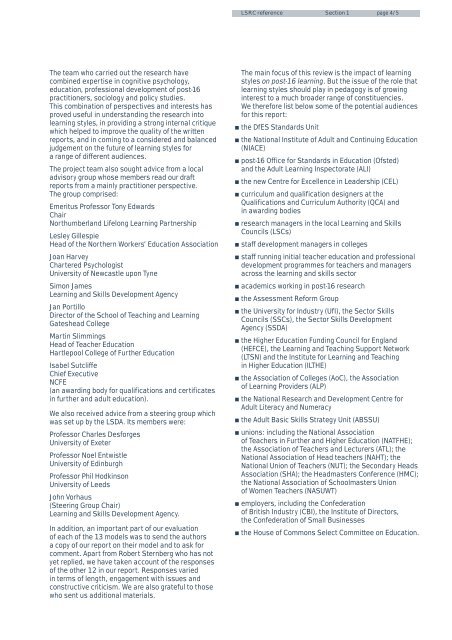learning-styles
learning-styles
learning-styles
You also want an ePaper? Increase the reach of your titles
YUMPU automatically turns print PDFs into web optimized ePapers that Google loves.
LSRC reference Section 1<br />
page 4/5<br />
The team who carried out the research have<br />
combined expertise in cognitive psychology,<br />
education, professional development of post-16<br />
practitioners, sociology and policy studies.<br />
This combination of perspectives and interests has<br />
proved useful in understanding the research into<br />
<strong>learning</strong> <strong>styles</strong>, in providing a strong internal critique<br />
which helped to improve the quality of the written<br />
reports, and in coming to a considered and balanced<br />
judgement on the future of <strong>learning</strong> <strong>styles</strong> for<br />
a range of different audiences.<br />
The project team also sought advice from a local<br />
advisory group whose members read our draft<br />
reports from a mainly practitioner perspective.<br />
The group comprised:<br />
Emeritus Professor Tony Edwards<br />
Chair<br />
Northumberland Lifelong Learning Partnership<br />
Lesley Gillespie<br />
Head of the Northern Workers’ Education Association<br />
Joan Harvey<br />
Chartered Psychologist<br />
University of Newcastle upon Tyne<br />
Simon James<br />
Learning and Skills Development Agency<br />
Jan Portillo<br />
Director of the School of Teaching and Learning<br />
Gateshead College<br />
Martin Slimmings<br />
Head of Teacher Education<br />
Hartlepool College of Further Education<br />
Isabel Sutcliffe<br />
Chief Executive<br />
NCFE<br />
(an awarding body for qualifications and certificates<br />
in further and adult education).<br />
We also received advice from a steering group which<br />
was set up by the LSDA. Its members were:<br />
Professor Charles Desforges<br />
University of Exeter<br />
Professor Noel Entwistle<br />
University of Edinburgh<br />
Professor Phil Hodkinson<br />
University of Leeds<br />
John Vorhaus<br />
(Steering Group Chair)<br />
Learning and Skills Development Agency.<br />
In addition, an important part of our evaluation<br />
of each of the 13 models was to send the authors<br />
a copy of our report on their model and to ask for<br />
comment. Apart from Robert Sternberg who has not<br />
yet replied, we have taken account of the responses<br />
of the other 12 in our report. Responses varied<br />
in terms of length, engagement with issues and<br />
constructive criticism. We are also grateful to those<br />
who sent us additional materials.<br />
The main focus of this review is the impact of <strong>learning</strong><br />
<strong>styles</strong> on post-16 <strong>learning</strong>. But the issue of the role that<br />
<strong>learning</strong> <strong>styles</strong> should play in pedagogy is of growing<br />
interest to a much broader range of constituencies.<br />
We therefore list below some of the potential audiences<br />
for this report:<br />
the DfES Standards Unit<br />
the National Institute of Adult and Continuing Education<br />
(NIACE)<br />
post-16 Office for Standards in Education (Ofsted)<br />
and the Adult Learning Inspectorate (ALI)<br />
the new Centre for Excellence in Leadership (CEL)<br />
curriculum and qualification designers at the<br />
Qualifications and Curriculum Authority (QCA) and<br />
in awarding bodies<br />
research managers in the local Learning and Skills<br />
Councils (LSCs)<br />
staff development managers in colleges<br />
staff running initial teacher education and professional<br />
development programmes for teachers and managers<br />
across the <strong>learning</strong> and skills sector<br />
academics working in post-16 research<br />
the Assessment Reform Group<br />
the University for Industry (UfI), the Sector Skills<br />
Councils (SSCs), the Sector Skills Development<br />
Agency (SSDA)<br />
the Higher Education Funding Council for England<br />
(HEFCE), the Learning and Teaching Support Network<br />
(LTSN) and the Institute for Learning and Teaching<br />
in Higher Education (ILTHE)<br />
the Association of Colleges (AoC), the Association<br />
of Learning Providers (ALP)<br />
the National Research and Development Centre for<br />
Adult Literacy and Numeracy<br />
the Adult Basic Skills Strategy Unit (ABSSU)<br />
unions: including the National Association<br />
of Teachers in Further and Higher Education (NATFHE);<br />
the Association of Teachers and Lecturers (ATL); the<br />
National Association of Head teachers (NAHT); the<br />
National Union of Teachers (NUT); the Secondary Heads<br />
Association (SHA); the Headmasters Conference (HMC);<br />
the National Association of Schoolmasters Union<br />
of Women Teachers (NASUWT)<br />
employers, including the Confederation<br />
of British Industry (CBI), the Institute of Directors,<br />
the Confederation of Small Businesses<br />
the House of Commons Select Committee on Education.


